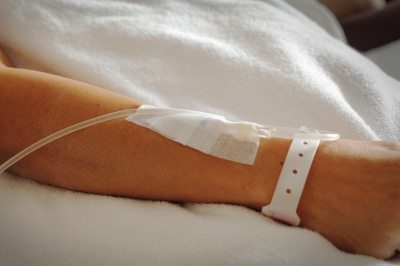[dropcap style=”font-size:100px; color:#992211;”]D[/dropcap]rug ’em up and kick ’em out. One for the politicians this, ever concerned as they are with how to minimise the use of those health systems we voted for.
More pain relief will help us sleep better and leave sooner.
Although anyone who’s been in hospital lately will have to admit that, if there’s one thing that really wrecks your night in hospital, it’s that damned cannula they stick in your hand to administer the dose.
That, and the nurses waking you up every hour to check if you’re dead.
Pain can make it difficult for some patients to get a good night’s rest while recovering in the hospital following certain surgical procedures, often resulting in longer hospital stays, according to researchers at Henry Ford Hospital in Detroit. The study shows patients who reported poor sleep while in the hospital following total hip replacement or knee replacement surgery had higher pain scores.
“Our results show that increased pain scores result in deceased sleep duration,” says study lead author Anya Miller, M.D., with the Department of Otolaryngology-Head & Neck Surgery at Henry Ford. “So better pain control could potentially improve sleep duration for these patients.”
The Henry Ford study sought to identify the amount of sleep disruption that occurs in the post-operative in-patient hospital setting. As previous studies on this topic have shown, patients commonly report being awoken by noise, lights or hospital staff while in the hospital.
That’s why for the Henry Ford study, Dr. Miller and study senior author Kathleen Yaremchuk, M.D., purposely chose a hospital floor that observes a quiet time between 10 p.m. and 6 a.m. where the doors are closed and lights are dimmed.
Fifty patients who had undergone total hip or knee replacement surgery were included in the study. These surgeries offer variables that are easier to measure in that the surgery and perioperative interventions are standardized with a pain protocol before and after surgery. The researchers looked at the patients’ total sleep time, sleep efficiency, pain scores and use of narcotics for pain.
The study results reveal:
Patients have significantly decreased sleep efficiency and wake more frequently when compared to the general population
Poor sleep results in higher pain scores
Better pain control can result in improved sleep efficiency and decreased awakenings
Improved sleep efficiency could result in decreased length of stay in the hospital after surgery
“Sleep is very important to patients’ recovery following surgery,” says Dr. Miller. “If we can identify factors that cause disruption in patients’ sleep such as pain, noise and interruptions in the hospital setting we can help improve sleep quality and potentially decrease adverse outcomes.”
Source: Henry Ford Health System
Photo: koratmember/freedigitalphotos.net

Some of the news that we find inspiring, diverting, wrong or so very right.



















